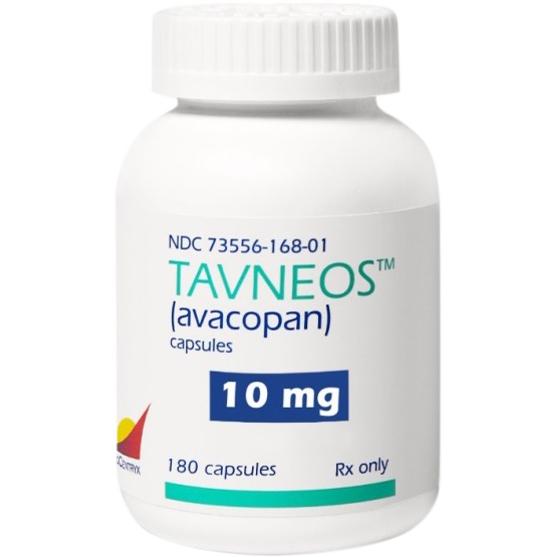Avacopan Disease Interactions
There are 2 disease interactions with avacopan.
Avacopan (applies to avacopan) infections
Major Potential Hazard, Moderate plausibility. Applicable conditions: Infectious Diarrhea/Enterocolitis/Gastroenteritis
Patients with active, serious infections, including localized infections, should avoid the use of avacopan. It is recommended to consider the risks and benefits before using this drug in patients with chronic or recurrent infection, those who have been exposed to tuberculosis, a history of a serious or an opportunistic infection, have resided or traveled in areas of endemic tuberculosis or endemic mycoses; or have underlying conditions which can predispose them to infection. Monitor closely for developing signs and symptoms of infections during and after treatment and, if appropriate, treat accordingly. Treatment interruption should be considered if serious or opportunistic infections develop.
References (1)
- (2021) "Product Information. Tavneos (avacopan)." ChemoCentryx, Inc.
Avacopan (applies to avacopan) liver dysfunction
Moderate Potential Hazard, Moderate plausibility. Applicable conditions: Liver Disease
Avacopan is not recommended in patients with active, untreated and/or uncontrolled chronic liver disease (e.g., chronic active hepatitis B, untreated hepatitis C, uncontrolled autoimmune hepatitis) and cirrhosis. It is recommended to obtain liver functions tests (serum ALT, AST, alkaline phosphatase, and total bilirubin) before treatment initiation, every 4 weeks for the first 6 months, and as clinically indicated. Promptly evaluate a patient receiving this drug if it presents with ALT or AST greater than 3 times the upper limit of normal (ULN) and consider withholding treatment temporarily as clinically indicated. Treatment should be discontinued until drug-induced liver injury is ruled out if a patient presents with ALT or AST 5 times the ULN, or develops transaminases greater than 3 times the ULN with elevation of bilirubin to greater than 2 times the ULN . Benefits and risks should be considered prior to administering this drug to patients with liver disease.
References (1)
- (2021) "Product Information. Tavneos (avacopan)." ChemoCentryx, Inc.
Switch to consumer interaction data
Avacopan drug interactions
There are 525 drug interactions with avacopan.
Avacopan alcohol/food interactions
There is 1 alcohol/food interaction with avacopan.
More about avacopan
- avacopan consumer information
- Check interactions
- Compare alternatives
- Reviews (4)
- Side effects
- Dosage information
- During pregnancy
- Drug class: selective immunosuppressants
- Breastfeeding
- En español
Related treatment guides
Drug Interaction Classification
| Highly clinically significant. Avoid combinations; the risk of the interaction outweighs the benefit. | |
| Moderately clinically significant. Usually avoid combinations; use it only under special circumstances. | |
| Minimally clinically significant. Minimize risk; assess risk and consider an alternative drug, take steps to circumvent the interaction risk and/or institute a monitoring plan. | |
| No interaction information available. |
See also:
Further information
Always consult your healthcare provider to ensure the information displayed on this page applies to your personal circumstances.


